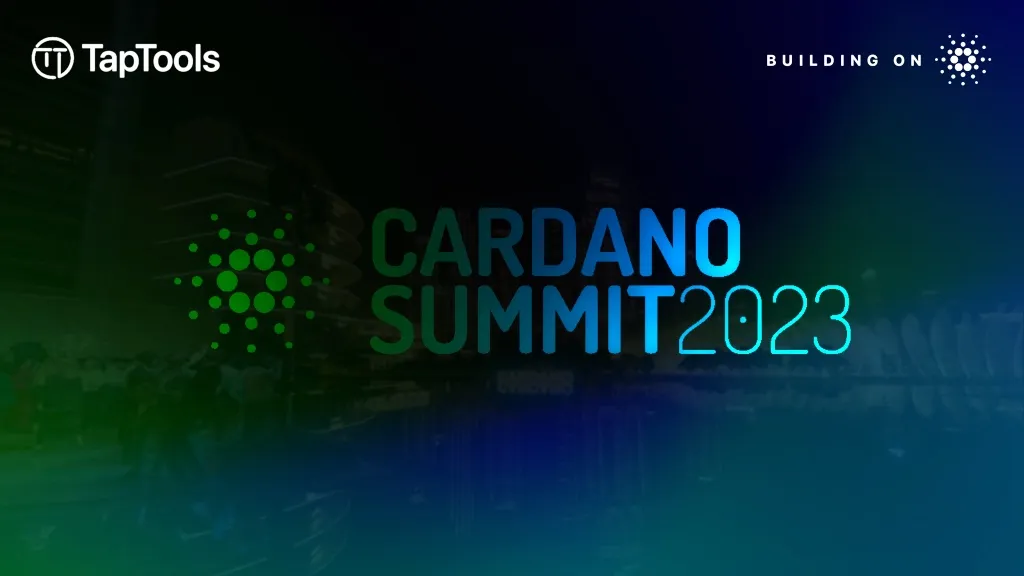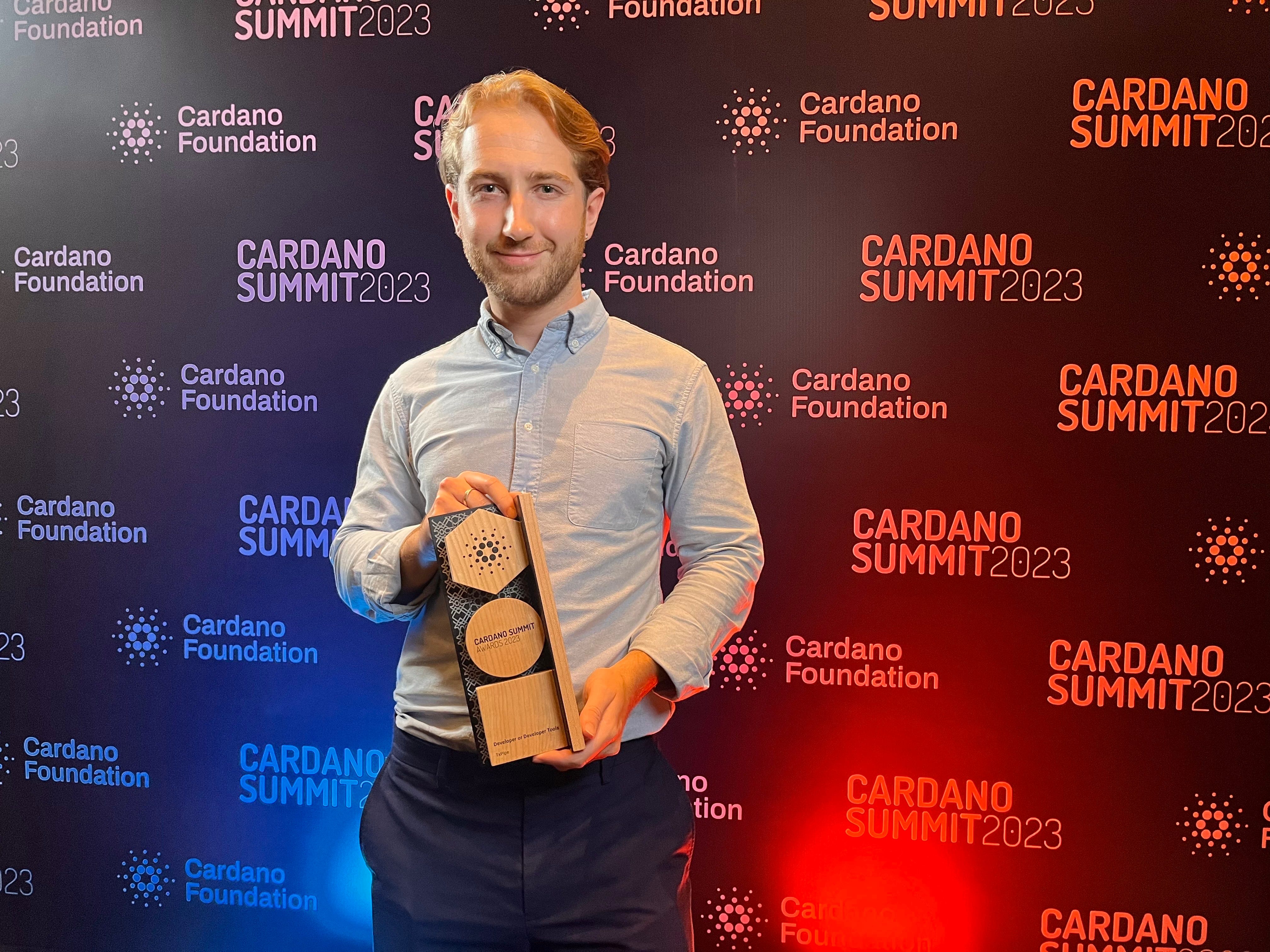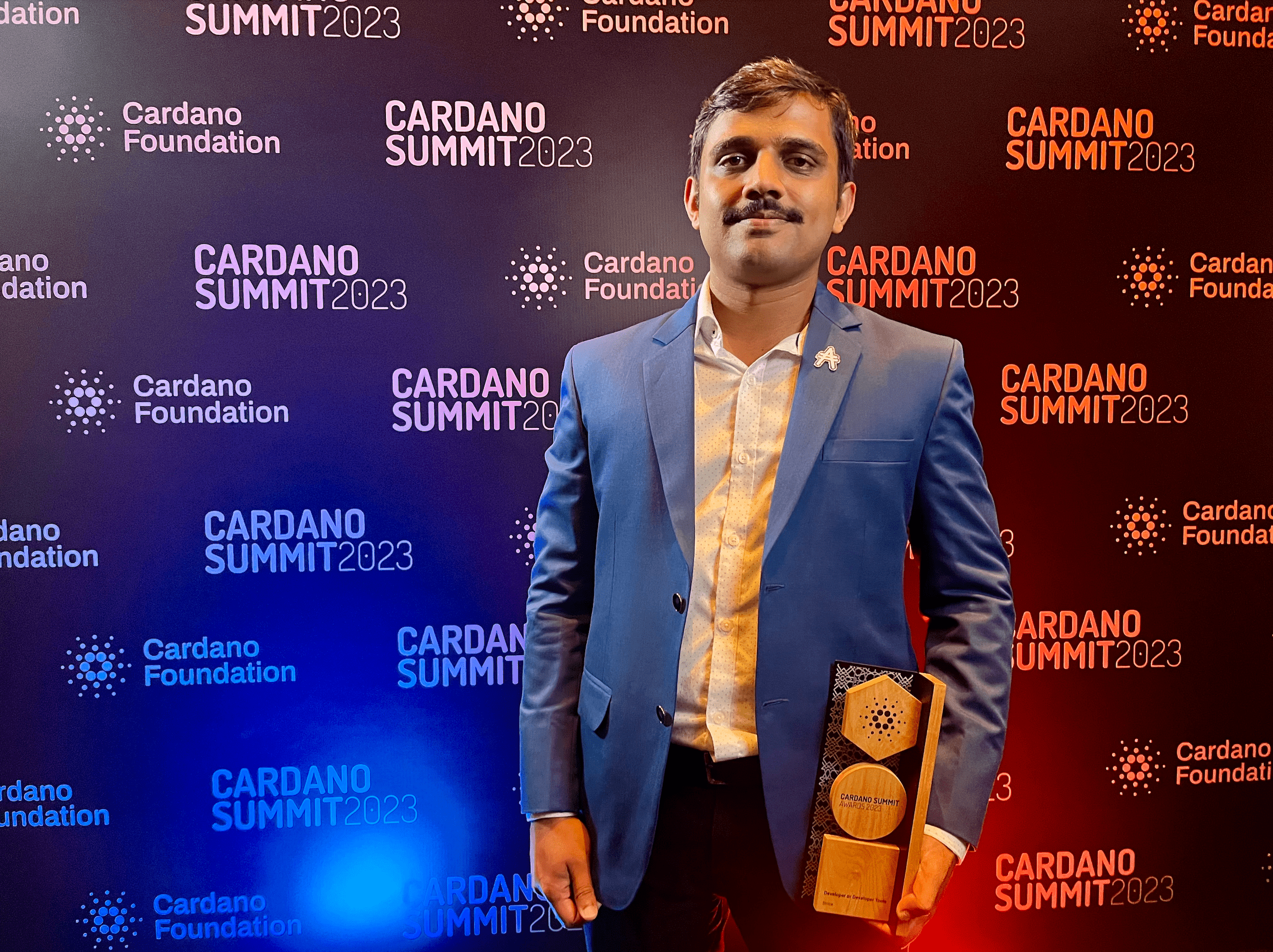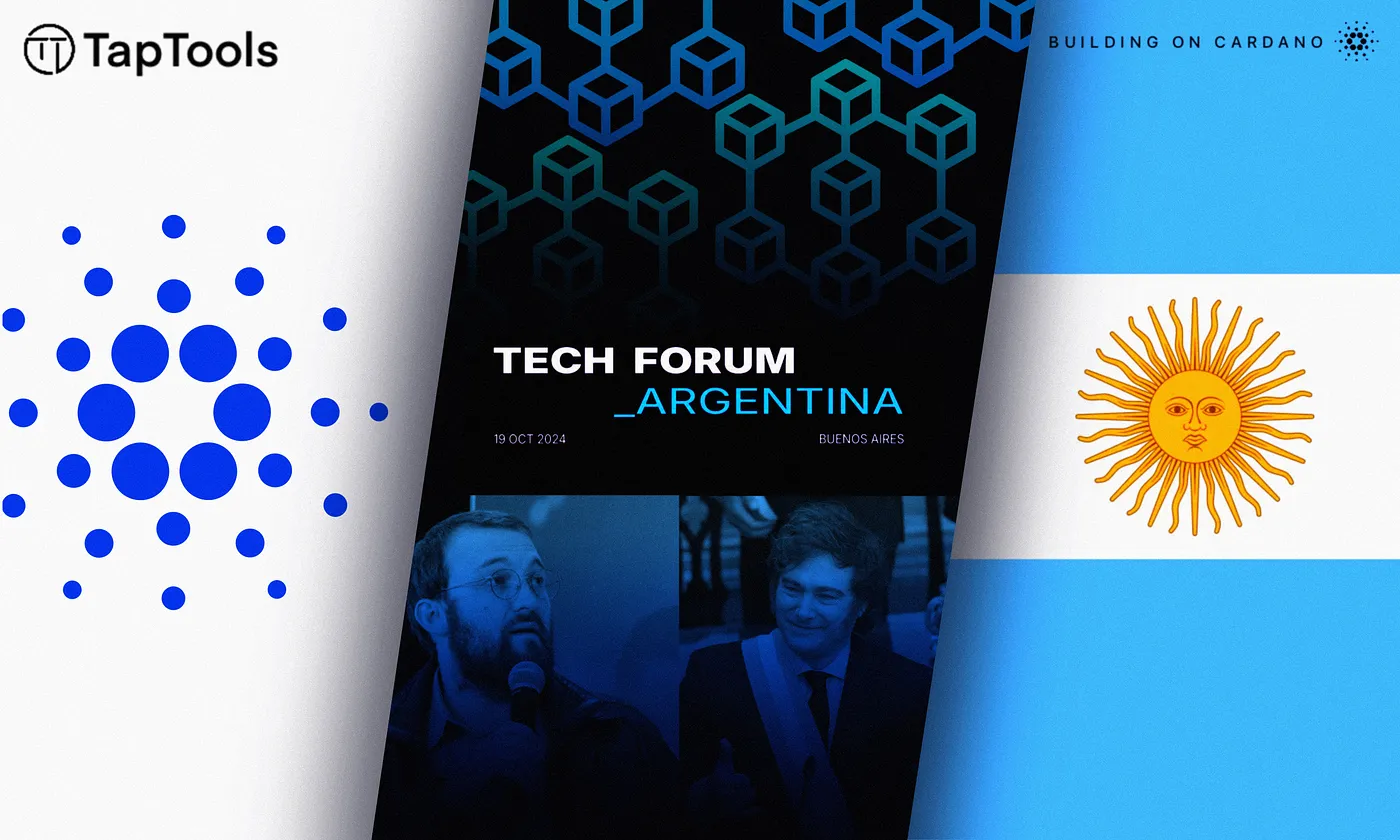Cardano Summit 2023
The Cardano Summit 2023, a three-day event held in the vibrant city of Dubai from November 2nd to November 4th, served as a global hub for blockchain technology enthusiasts.

The Cardano Summit 2023, a three-day event held in the vibrant city of Dubai from November 2nd to November 4th, served as a global hub for blockchain technology enthusiasts. Organized by the Cardano Foundation, it brought together the Cardano community and a diverse audience, including community members, developers, innovators, investors, and inquisitive minds, all contributing to the momentum toward a brighter blockchain-powered future.
In this article, we will delve into the key highlights and insights from the Cardano Summit 2023, offering a comprehensive overview of the event and its significance in the blockchain space.
Battle of the Builders
In a thrilling showcase of innovation, 10 Cardano-based startups took center stage at the Battle of the Builders, pitching their groundbreaking projects for a chance to secure coveted prizes. The event was kickstarted by Cardano Foundation CEO Fred Gregaard, who extended a warm welcome to the audience gathered in Dubai. In his opening remarks, Gregaard underscored Cardano’s growing influence in the blockchain space, emphasizing the power of unity within the community. He noted, “I think the world is changing, not only is the world coming to Cardano, but the world is also realizing what we can do when we stand together as a community.” Gregaard further emphasized the importance of events like the Summit, where individuals can come together to interact, highlighting the fundamental role of human interaction in the blockchain sphere.
Fred Gregaard also took a moment to underscore Cardano’s impressive track record, boasting over 2000 days of uninterrupted uptime, a feat previously achieved only by Bitcoin in the blockchain world.
10 Visionary Projects Unveiled
The Battle of the Builders featured a diverse array of pioneering projects that reflect the vibrancy of Cardano’s ecosystem.
NMKR: The first project to take the stage, NMKR, introduced its one-stop solution for launching tokens and NFTs on the Cardano blockchain. Patrick, the project’s representative, discussed their range of products, including NMKR Studio, which allows businesses to upload their NFTs or tokens, and NMKR Pay, a checkout solution enabling customers to pay in their preferred currency, whether it’s Cardano, BNB, Bitcoin, or fiat currencies. Patrick delved into the technology’s development and its proven effectiveness, highlighting that NMKR is actively onboarding more businesses onto the platform.
NEWM: Co-founder and co-CEO Florian presented NEWM’s decentralized music platform. Florian described how NEWM had developed a protocol and was working on a distribution and minting platform to create a comprehensive ecosystem. The project focuses on music downloads and royalties, addressing issues related to music industry power dynamics and artists’ rights. Fractionalized NFTs offer a solution, ensuring that music is delivered to artists and royalties are distributed via NEWM tokens, benefitting independent artists.
Xerberus: Simon Peters pitched Xerberus, a Risk Rating protocol. The project provides risk ratings for user portfolios, along with risk and post-effect reports that analyze events such as Ardana. Xerberus relies on objective truths inscribed in blockchain transactions to create and update risk ratings, delivering accurate and up-to-date information in a volatile space.
Fida: Rudolpho Hansen introduced Fida, a layer-one insurance platform built on Cardano. Hansen addressed the inadequacies of the current insurance industry, focusing on the high number of uninsured individuals and the financial inefficiencies. Fida’s on-chain contracts, fractionalized on the blockchain through tokenization, allow individual investors to compete with large entities, simplifying the insurance process and increasing its profitability.
Mehen Finance: Mehen Finance, represented by Matt, unveiled a USD-backed stablecoin set to launch on Cardano in December. Matt emphasized the essential role of USD-backed stablecoins in the ecosystem, leveling the playing field with other blockchain networks through capital efficiency. He discussed how Mehen Finance adopted a strategy similar to Circle, the issuer of USDC, obtaining regulatory clearance state by state within the US to remain in compliance with both federal and state regulations.
Iagon: Navjit Dhaliwal presented Iagon, an AI-driven shared storage and compute economy. Iagon offers decentralized GDPR and regulatory-compliant data storage and computing services on Cardano, catering to the growing cloud computing market’s forecasted value of $2.43 trillion by 2030. Iagon’s solution empowers businesses to utilize decentralized computing and file storage, aligning with regional regulations and streamlining the process for enterprises.
ZKFOLD: Aiming to enhance Cardano’s scalability, ZKFOLD, a Zero-Knowledge Rollup Scaling Solution, was presented by its two co-founders. ZKFOLD’s secure layer-2 solution addresses concerns about transaction costs, storage, and computation complexity on layer 1. By leveraging ZK technology, it can process thousands of transactions in a single batch on layer 1, followed by a single transaction as proof, reducing costs by up to 100x. ZKFOLD’s off-chain computations and compressed utxo computations further enhance scalability, enabling Dapp developers to create secure smart contracts on ZKFOLD without modifying their current contracts.
Maestro: Maestro is a The complete Web3 stack for Cardano Blockchain, enabling projects to easily create blockchain explorers, wallets, launch an ISPO, and Defi Dapps.
Additional projects, such as TVVIN, a tokenization and real-world asset platform, rounded out the presentations, highlighting the diverse and innovative landscape of Cardano’s growing ecosystem.
Battle of the Builders results:
1st Place: Maestro
2nd Place: NEWM
3rd Place: ZK Fold
Welcome to Dubai
Dr. Marwan Al Zarouni, the CEO of the Dubai Blockchain Center and a strategic advisor to Dubai’s economy and tourism, set the stage with the opening keynote at the 2023 Cardano Summit, aptly titled “Welcome to Dubai.” During his address, Dr. Al Zarouni shed light on the significance of November 3rd as Flag Day in the United Arab Emirates, a day that unifies the nation. He also underscored the remarkable transformation of Dubai, which emerged from modest origins to become a global powerhouse in the realms of economics, society, and innovation within the Middle East.
Moreover, Dr. Al Zarouni stressed the importance of taking initiative, citing it as a key driver for progress, rather than relying on luck or circumstance. He elaborated on Dubai’s journey into the digital age, pointing out that in the year 2000, Dubai embraced the concept of an “Internet City” with a fully digitized E-Government system.
Dr. Al Zarouni further highlighted Dubai’s technological leadership over the past two decades, which included the city becoming the world’s first fully blockchain-powered metropolis by 2020. Notably, property transactions, value exchanges, and settlements are executed seamlessly through smart contracts, marking a significant leap in the efficiency and transparency of these processes.
He also touched upon the transformative impact of the Smart Dubai initiative, which not only elevated the city to be one of the safest in the world but also harnessed data-driven insights to enhance the lives of its residents, promoting prosperity and well-being across the community. Dubai, under Dr. Al Zarouni’s guidance, has harnessed innovation, technology, and initiative to create a thriving and forward-thinking city.
Those who depend on luck or circumstance, will never get things done and they will always be disappointed. You have to take initiative. Don’t depend on luck or circumstance, take a step every single day to achieve the future. Set your own standards, build your own projects, do something that nobody else dared to do. — Dr. Marwan Al Zarouni
Cardano Past Present & Future
Charles Hoskinson, the founder of Cardano and CEO at Input Output Global (IOG), delivered an insightful presentation in Dubai, shedding light on Cardano’s past, present, and future. Hoskinson outlined Cardano’s journey based on the strategic pillars of Scaling, Governance, and Interoperability. Hoskinson celebrated the remarkable progress made over the last seven years, from extensive research and the development of millions of lines of code to billions of transactions, the proliferation of NFTs, and a flourishing ecosystem of dApps.
Charles also highlighted significant ongoing initiatives, including the promising advancement of Hydra, set to enhance Cardano’s scalability. He touched on developments in Plutus V3 and BLS signature support, which hold the potential to introduce transformative features to the platform.
Charles spoke about how the IOG decided the best way to move forward with partner chains was to use Substrate, a blockchain framework that allows you to build customized blockchain nodes. Substrate solves the issue of not every blockchain being suitable for every network by allowing you to mix and match features to suit the project’s needs. Substrate is the technology that powers Polkadots sidechains. Years ago Polkadot copied Cardano’s Ouroboros Proof-of-Stake (PoS) Consensus Mechanism, making this an interesting exchange of adoption between the two blockchains in this open source industry that has a focus on interoperability.
Interoperability emerged as a central theme in Hoskinson’s presentation, underlining its role in moving from isolated islands to a globally interconnected world. Hoskinson emphasized the importance of collaboration and partnership within the cryptocurrency industry.
The presentation briefly touched on various crucial developments within the Cardano ecosystem, including the groundbreaking Minotaur Paper. This concept envisions Cardano evolving into a “Blockchain of Blockchains” protocol, accommodating multiple consensus mechanisms and addressing interoperability and maximalism challenges.
Notably, Hoskinson introduced Midnight, a fourth-generation blockchain that focuses on enterprise adoption, offers optional privacy features, and is regulatory-friendly. Midnight is built on the concepts researched in the Minotaur Paper, allowing for multi-consensus-powered blockchains.
“Interoperability is the difference between living on an island and living in a world.” — Charles Hoskinson
Minswap V2 Sneak Peek
In an exclusive sneak peek during the Cardano Summit, Minswap Labs unveiled Minswap V2, a highly anticipated upgrade to the decentralized exchange (DEX) that promises to redefine the Cardano DeFi landscape. Notably, Minswap V2 comes with fresh branding and an entirely new user interface (UI), enhancing both the aesthetics and functionality of the platform.
Enhanced Speed and Innovation with Aiken
Minswap V2 leverages Aiken technology to significantly boost transaction speed, potentially achieving up to five times faster transactions compared to its predecessor. This technological advancement highlights Minswap V2’s commitment to efficiency and user responsiveness. Moreover, Minswap V2 is open-sourced, promoting transparency and trust within the Cardano community. The decision to open-source the project can greatly benefit the Cardano ecosystem by allowing developers and the wider community to scrutinize, collaborate, and contribute to its continued development. This fosters a sense of shared ownership and encourages innovation in the DeFi space.
Empowering Traders
Minswap V2 introduces a range of new and dynamic features designed to elevate the trading experience:
- Auto-Routing: Through the Smart Order Routing Algorithm, Minswap V2 seeks out the best prices across multiple pools, enabling traders to make informed decisions.
- Dynamic Fees: Minswap V2’s dynamic fee structure adapts to market conditions, enabling liquidity providers to optimize their returns in ever-changing market environments.
- Advanced Order Types: Minswap V2 introduces advanced order types to cater to diverse trading strategies, including Take Profit, Stop Loss, Once-Cancels-the-Other (OCO), and Zap-Out. These features empower traders to implement more sophisticated trading strategies.
Minwallet V2
Minswap V2 not only enhances the trading experience but also offers improved asset management with Minwallet V2. This new version introduces the Profiles feature, allowing users to claim a Minswap username. Users can send and receive funds, customize their profiles, add wallets, track their positions, and enjoy a comprehensive set of tools for managing their assets.
Minswap Pro
Minswap Pro introduces an upgraded DeFi trading platform designed to provide users with a more refined and efficient trading experience. This enhanced platform offers improved user interface, analytics, and reduced trading fees
You can sign up to Beta Test Minswap V2 here.
Wallets, Wearables, Payments: The Tangem Revolution Unleashed
Tangem, a well-known Swiss-based hardware wallet producer, made a significant debut at the 2023 Cardano summit with their latest innovation, which left attendees in awe. In a masterclass workshop titled “Wallets, Wearables, Payments: The Tangem Revolution Unleashed,” Tangem introduced their newest cold wallet prototype, the Tangem crypto ring. This wearable cold storage wallet boasts impressive features, including a secure element chip, battery-free operation, IP68 rating for resistance to dust, water, and extreme temperatures (-25°C to 50°C), and NFC compatibility. The device seamlessly communicates with the Tangem App using NFC technology. As a special treat for workshop participants, all 100 rings were given away, creating a buzz around this unique cold storage device. Those lucky enough to receive a Tangem Ring will be the first to possess it before it becomes publicly available. Additionally, Tangem revealed exciting details about Tangem Pay, the first-ever hardware wallet certified for direct payments on the VISA network. Tangem Pay is a self-custodial payment card with cold storage that can be used at 95 million VISA terminals worldwide.
The Tangem Ring is set to launch in 2024 and will enable users to create a new seed phrase or import an existing one. Tangem emphasized that the ring’s security is robust. As they stated on a platform formerly known as Twitter, “Possessing just the ring does not grant an attacker access to the funds stored on it.” A PIN or biometric authentication is still required to access the funds on this hardware wallet ring. The Tangem Ring, made of durable Zirconium Dioxide, a strong ceramic material also used in rings, dental crowns, and joint implants, is expected to be a game-changer in the world of cryptocurrency hardware wallets.
“Possessing just the ring does not grant an attacker access to the funds stored on it.” — Tangem
Tokenizing Real-World Assets for a Digital Future
A panel of experts, headed by Sandro Knopfel of the Cardano Foundation and including Brice Vandevoorde of Realiz, Nilay Saha of ReitCircles, Monty C. M. Metzger of LCX, and Marcus Maute of BridgeTower Capital, discussed how blockchain technology is transforming the financial landscape by converting physical assets into digital tokens. This trend has unlocked new possibilities for capital markets, businesses, and more, blending the real world and digital through blockchain.
Monty, the founder and CEO of LXC, a centralized exchange based in Liechtenstein, spoke about how as a regulated entity in Liechtenstein, they received a registration called physical validator which allows LCX to legally tokenize real world assets. He explained, “We think the future will be tokenized and unlocking new trillion dollar markets — probably the next wave of the whole crypto industry will be driven by token financial assets or tokenized real world assets.”
The panel went into detail about how Real World Assets and their Tokenization will act as a bridge between the physical realm and blockchain, providing even more value in web3. Nilay Saha of ReitCircles spoke about the steps and processes behind transitioning real world assets to blockchain and the challenges of doing this as well as staying in compliance with the regulatory space and how he uses his experience in the banking world in this industry. Marcus Maute of BridgeTower Capital spoke about how Tokenization got him into blockchain. “It was not bitcoin back in 2016 when I started in the industry, it was tokenization, tokenization of real world assets and more or less bringing everything on-chain to make it tradeable and make it way more efficient.”
Marcus Maute of BridgeTower Capital spoke about how Carbon Credits are starting to be a major driving force behind tokenization with the global push to go green. The panel also discussed how Cardano is an ideal platform for tokenization due to its decentralization and security. Cardano has had no hacks, and the standardization of tokenization will be a driving force of tokenization in web3 for everything from bonds to tokenized money to real-world assets such as diamonds.
“It was not bitcoin back in 2016 when I started in the industry, it was tokenization, tokenization of real world assets and more or less bringing everything on-chain make it tradeable and make it way more efficient.” — Marcus Maute
State of Web 3.0 in Africa
During the mainstage discussion at the Cardano Summit, Yosuke Yoshida, Co-CEO of Emurgo Middle East and Africa, shared insightful updates on their impactful initiatives in Africa and the growing Web3 landscape on the continent. Yoshida’s primary focus on Africa and the Middle East made his perspective particularly enlightening for the audience.
The decision to prioritize Africa as a key target was grounded in compelling reasons. With a vast population of 1.4 billion people and a median age of around 20 years, Africa boasts a youthful, tech-savvy demographic. Additionally, mobile penetration rates exceeding 40% indicate a readiness for new technologies to flourish. Notably, the venture capital (VC) sector in Africa has witnessed an astounding 18-fold growth over the past six years, defying the global economic downturn. Within the domain of Web3, this VC surge is even more remarkable, expanding by 11-fold in just one year.
Yoshida proceeded to elaborate on the pivotal role of blockchain and Web3 technologies in addressing Africa’s unique challenges. For example, stablecoins have emerged as a solution for those lacking access to traditional banking and facing steep transaction fees. These individuals can now employ stablecoins to shield themselves against local currency depreciation and facilitate remittances.
Furthermore, blockchain is revolutionizing the interbank settlement system in Africa. A Nigerian startup has developed a blockchain-based system that enables direct transactions between banks, sidestepping the cumbersome and costly central server-based processes prevalent in developed countries.
Yoshida emphasized that the perception of blockchain and cryptocurrencies in Africa differs from that in developed nations. While some may view them as speculative or fraught with scams, in Africa, people see them as a practical solution to real-world financial problems and a promising avenue for the future.
Emurgo has actively invested in over 40 companies across Africa, many of which are eager to build on the Cardano platform or issue tokens on it. Their holistic approach includes investment, acceleration, development support, and robust marketing, positioning them as a leading force in the African Web3 ecosystem. They have also cultivated valuable partnerships with key stakeholders in the region.
In closing, Yoshida, drew a parallel with China’s rapid adoption of digital payments, and confidently asserted that Africa stands on the brink of a similar transformative journey, making it an exciting frontier for those interested in Web3 and blockchain technologies. His palpable enthusiasm for Africa’s potential was evident, and he urged the audience to explore the recently released “African Web3 Report,” a collaborative effort with PwC, while emphasizing the significance of staying informed about developments in Africa, as he believes the continent will embrace Web3 technologies at a faster pace than other regions.
“My interest gradually grew towards the emerging markets. Why? Because I thought and we thought that technology and blockchain, it makes much more sense in the emerging markets than in the developed markets” — Yosuke Yoshida
Closing Keynote: Looking Ahead to 2024 and Beyond
Charles Hoskinson, the founder of Cardano and CEO of Input Output, alongside JJ Siler, the Chief of Staff of Input Output, delivered the closing keynote at the 2023 Cardano Summit in Dubai, aptly titled “Looking Ahead to 2024 and Beyond.” In this momentous address, Hoskinson and Siler not only celebrated the tremendous growth of the Cardano ecosystem but also provided a glimpse into the promising future that lies ahead.
Looking forward, the duo delved into the ecosystem’s expansion and what to anticipate in the coming years. They specifically highlighted the pivotal role of Cardano’s governance testnet, known as Sancho Net, which is currently being tested as a precursor to the Voltaire Hardfork. This testnet underscores the collaborative spirit of the Cardano community, with participants working together to address challenges and refine the network’s governance structure.
Moreover, the discussion extended to the profound potential of blockchain technology in Africa, recognizing its capacity to bring transformative change across various sectors, including trade, financial services, supply chain management, logistics, and healthcare accessibility. The Cardano team also explored the broader global impact of blockchain and cryptocurrencies, underscoring the innovative possibilities that await in different corners of the world.
In a significant move towards advancing Cardano’s vision for Decentralized Finance (DeFi), RealFi, and other industries, Input Output has appointed Sean Ford, a former CEO of Algorand, to lead an innovative stablecoin venture. This strategic decision signals Input Output’s commitment to elevating Cardano’s capabilities, and Sean Ford’s extensive experience in dealing with central banks and closing deals further strengthens Cardano’s position in the cryptocurrency and blockchain landscape. To support Sean Ford in this endeavor, David Markley, another seasoned executive from Algorand, has taken on the role of Chief Operating Officer (COO). Their collective expertise is set to drive Cardano’s mission to new heights. When speaking about the long term vision of IOGs new stablecoin venture, Charles emphasized the proactive role it will play: “Over time what that company will do is basically make sure that either directly or indirectly through partnerships that Cardano is not left behind in the stablecoin side”
As Cardano continues to evolve and expand its reach, the summit’s closing keynote served as a resounding declaration of the blockchain’s commitment to fostering a more transparent, equitable, and technologically advanced future. It reinforced the notion that Cardano is not just a cryptocurrency but a catalyst for positive change, guided by a community eager to push the boundaries of what’s possible in the realm of decentralized finance and beyond.
“Over time what that company will do is basically make sure that either directly or indirectly through partnerships that Cardano is not left behind in the stablecoin side”
Gala Awards
After the conclusion of the Cardano Summit Events, there was a Gala Dinner held, followed by Gala Awards, where awards were given out for various categories having been voted on by Cardano Community members. We’ll now go over the various categories and category winners.
Developer or Developer Tools Winners


The Developer or Developer Tools Winners were Strica and Tx Pipe.
DeFi / DEX Winner
The winner for best Defi platform/ DEX at the 2023 Cardano Summit was Minswap.
Marketplace Winner
The award for best Marketplace went to jpg.store
Blockchain For Good Winner
The winner of the Blockchain For Good award was World Mobile for their exceptional environmental or humanitarian work.
CIPs Winner
The winner for the CIP Category was Adam Dean, Co-Founder of Buffy Bot, NFTxLV, DripDropz & more.
Ambassador Winner
The Ambassador award of the 2023 Cardano Summit was won by Guillermo Moratorio.
Educational Influencer Winner
The award for Educational Influencer went to Dapp Central.
Cardano Hackathon
The winner of the first Cardano Hackaton was Maestro led by Marvin Bertin for their work on No-code Plugin for Governance Smart-Contracts.
NFT Project Winner
The NFT project winner was Hosky for most impactful art, music, metaverse, gaming, or collectible NFT project in the Cardano community.
Self Sovereign Identity (SSI) Winner
The winner of the SSI Award was IAMX for their phenomenal management and governance of credentials, identity, tokens, or others.
Most Impactful SSPO Winner
The winner of the Most Impactful Single Stakepool Operator award went to SMAUG pool
Conclusion
The 2023 Cardano Summit in the visionary city of Dubai marks a pivotal moment in Cardano’s journey. Dubai, at the forefront of the Web3 and blockchain revolution, provides an ideal backdrop for this strategic move, signifying Cardano’s aspiration to become a leader in decentralized finance (DeFi), real-world finance (RealFi), and various industries. Dubai’s commitment to innovation aligns perfectly with Cardano’s vision of a decentralized and inclusive future. With the insights and connections from this summit, Cardano is well-positioned to lead the blockchain landscape, shaping the future of Web3 and blockchain applications.
You can view on on demand content for the 2023 Cardano Summit at the following link: https://summit.cardano.org/on-demand-content-2023/
Delegate Your Voting Power to FEED DRep in Cardano Governance.
DRep ID: drep12ukt4ctzmtf6l5rj76cddgf3dvuy0lfz7uky08jfvgr9ugaapz4 | We are driven to register as a DRep by our deep dedication to the Cardano ecosystem and our aspiration to take an active role in its development, ensuring that its progress stays true to the principles of decentralization, security, and community empowerment.DELEGATE VOTING POWER!







